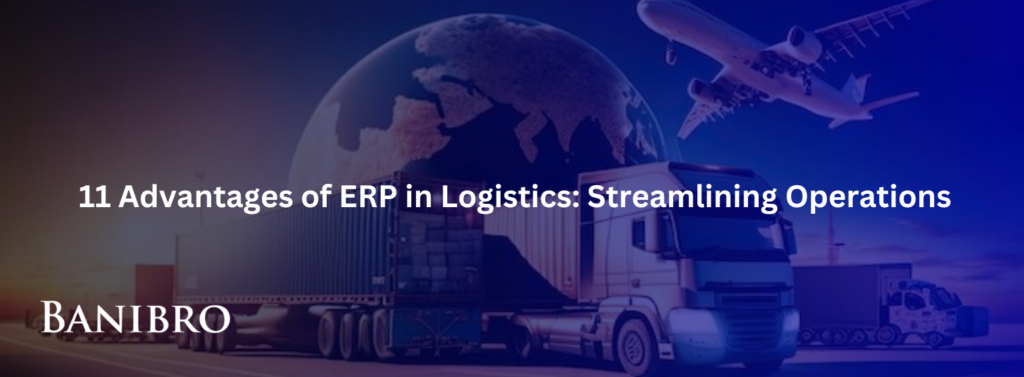
Logistics has the major impact in the success of any company in today’s business market. An Important aspect to maintain throughout the supply chain is maintaining the efficient management of goods and information. ERP software has transformed a crucial change in technologies of the logistics industry. The ERP logistics software provides a complete solution for managing various aspects of logistics operations. This blog aims to explore 11 key benefits of implementing an Odoo ERP system in the logistics industry.
The stages of logistics processes such as in inventory levels, order status, and shipment tracking needs the major aspect of real-time visibility, which is provided by ERP logistics software, as a result of enhanced visibility, logistics managers are able to make informed decisions, identify barriers, and proactively resolve issues, improving efficiency and customer satisfaction.
ERP system functions logistics operations improving efficiency by reducing lead times, optimizing resource allocation, minimizing errors by automating manual processes and integrating data across departments and ultimately boosts productivity.
For precise inventory management it is necessary to track inventory accurately and efficiently, which is made possible with real-time ERP solutions. To reduce carrying costs and improve cash flow logistics companies maintain optimal inventory levels, prevent stockouts, and avoid excess stock.
ERP software helps logistics companies analyze historical data, market trends, and customer demands to sketch accurate demand trends. This enables proactive planning, reducing stockouts, minimizing excess inventory, and ensuring on-time deliveries, eventually enhancing customer satisfaction.
Logistics ERP software helps connect the entire supply chain, from suppliers to customers, ensuring everything runs smoothly. By improving communication and collaboration, it allows real-time information sharing, leading to better coordination and fewer delays. This ultimately enhances customer service and keeps things moving efficiently.
To optimize route planning ERP for logistics incorporates geolocation data and transportation difficulties, with minimizing transportation costs, reduced fuel consumption, and enhanced on-time deliveries by selecting the most efficient routes based on real-time traffic information and different factors.
Logistics companies can function warehouse management.by integrating warehouse operations with ERP software. ERP system provides real-time visibility into warehouse activities, enabling efficient resource allocation, space utilization, and inventory tracking from receiving and put-away to picking and packing processes.
ERP software provides real-time financial reports by consolidated financial data, automates accounting processes. This facilitates business growth tracking precise costs, analyzing profitability and by ensuring compliance with financial regulations for better financial decision-making.
With ERP logistics software, companies can maintain a detailed customer database, track communication and manage customer interactions. This brings personalized customer service, efficient order processing, and timely resolution of issues, leading to improved customer satisfaction and reliability.
ERP system provides precise insights to logistics managers by collecting and analysing large volumes of data. With this up-to-date information, decision makers optimize and improve overall business performance by identifying trends, evaluating performance metrics, and making data-driven decisions to enhance logistics operations and reduce costs.
As logistics companies expand and develop, ERP system easily manages the requirements effortlessly whether it’s scaling operations, integrating new functionalities, or adapting to market dynamics, ERP software meets the business requirements by its flexible customization options.
ERP implementation in the logistics industry gains the most predominant results in significantly enhancing operational efficiency, customer satisfaction, and overall business performance. ERP systems boost logistics companies to stay ahead in the competitive landscape providing enhanced visibility and inventory optimization to streamlined warehouse management and data-driven decision-making, ERP software attains best out of the businesses to achieve sustainable growth in today’s dynamic business environment.